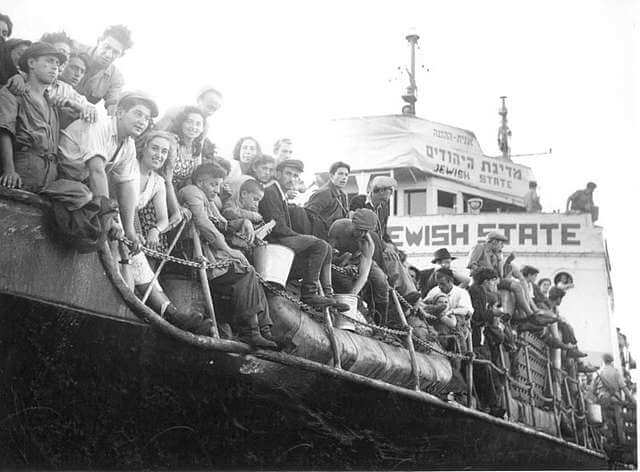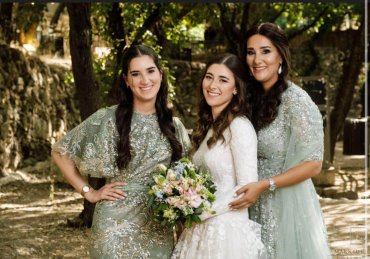
More than 850,000 Jews were Forced to Leave Arab Countries — Here’s One Family’s Story
If you’ve been living on social media these days like so many of us, it’s become a bleak place. The reality of the events occurring is devastating. Each day I awaken with fear of what news is going to come to my phone next.
Some of that scare factor comes from the mass amounts of pro-Palestinian rallies there are in American and around the world. I’m not sure if it’s scarier or makes me feel better when I come to understand that so many of these people have no idea what the actual history is about the area they’re chanting so passionately for.
There have been Jewish men, sometimes in disguise, and sometimes not, interviewing protestors to see if they actually even understand the words they’re saying. In one interview I saw, the girls that looked no older than 25 and were decked out in green and red paint as if they were going to a football game said that the Jews should, you know, just go back to the countries they came from.
In all this talk about the Jews “colonizing” Israel, so many don’t even know that Israel was the place Jews had to go to because they were kicked out of somewhere else. It wasn’t just a fun mission of conquering a land (which by the way is completely indigenous to the Jews), it was a place of refuge. For some, it was refuge after the Holocaust. For others, it was there when they were actually kicked out of all the other Arab lands around them.
Israel represents a little sliver of hope, freedom and simply existence for the Jewish people. That’s why it’s so infuriating that the world doesn’t even want to allow us that much.
Today, November 30, is the day the Israeli Knesset actually adopted as a national day of commemoration for the 850,000 Jewish refugees who were displaced from Arab countries and Iran in the 20th century.
Jews lived in Arab lands for thousands of years and many of their communities were actually there before the advent of Islam. In the 20th century, Arab nationalism rose around them and it was no longer safe to be a Jew in many of these places.
According to the Israeli government, “Arab states expropriated property of their native Jews, and denaturalized, expelled, arrested, tortured and murdered many of them.”
Ariel Homapour (who goes by Ariel Laurent now) knows this story well. His mother and father left Iran and Pakistan, respectively, after experiencing fear and oppression there. Ariel himself is the eldest child in his family and the first born outside of Iran in the last thousand years of his family’s history.
His father, Morris, left when he was just 16 years old in 1987. At that age, you could be drafted into the military in Pakistan. Laurent says they didn’t have time to actually train the teenagers taken into the army and even with that, would just take them straight to the frontlines right away and naturally, many were killed right away.
Ariel’s grandmother hid his father in an underground cellar for six months so he wouldn’t be drafted. After that, they paid someone who was driving a caravan to Iraq to smuggle him out (which was a common practice at the time). The first person they paid actually stole their money and left. The second worked out though and so Morris was driven covertly across the border.
Once they got there, they were getting shot at by the Islamic regime. He ran the rest of the way.
In Baghdad, there was no clean, running water. It was muddy, with worms coming out of it. He knew if he drank that water he would get very sick so lived off of Coca Cola for 5-6 weeks. From there, he took a flight to Vienna, Austria where he waited for a few months before he could get into the United States. He survived in Vienna by shoveling ice to make money.
When he got to America, he stayed with his uncle in Queens. He worked at a flea market selling random odds and ends and helped in the jewelry business. Eventually, he saved enough money to open a woman’s clothing store called High Image. It initially had just five to six items in the whole store. He grew this business to two different locations — in Brooklyn and Long Island that existed until right before Covid.
“He never really had a childhood,” Ariel shares. “He had to grow up really fast and always had to work hard. He never really had anybody to lean on. That’s the trauma of war, it’s really hard.”
Morris’s family in Iran owned many dry cleaning locations which were all pretty much taken away from them. The rest of his family stayed there until 2001 when they moved to Israel. It wasn’t until that year that Morris saw the rest of his family again — more than 20 years.
Ariel’s mother got to leave with her family, but didn’t know she was leaving for good until they never looked back.
They went to Israel from Iran to visit a sick relative but were planning to come back. Then, they didn’t. The revolution in Iran was getting so bad and being Jewish was such a fear, they decided to stay. They went back one time two years later to gather some of their personal belongings, but weren’t able to take all of it because so much had been seized by the government.
That was in 1978, when his mother was ten-years-old. She also demonstrated immense resilience amid the struggle to start over. In Israel, she was bullied because she couldn’t speak the language. When she was 12, in 1980, her family moved to America and she had to learn yet another new way to speak.
While the mountain felt almost too high to climb, she did it gracefully. She learned English, went to high school and college in America, grew to the top of her class and became a CPA.
His parents met each other when they were 26 at a wedding in New York.
Ariel’s parents made sure to keep their heritage alive in the next generation. Ariel and his two younger siblings speak Farsi. “They made sure I didn’t lose the Persian language,” he says. He grew up in Roslyn and didn’t learn English until he went to Kindergarten.
Now, his parents are having flashbacks to having to uproot their entire lives. With the rising antisemitism in the U.S., they’re scared. “They always say how much they sacrificed to get here,” he says. “It was always a land of refuge. It’s very traumatic for them with the rise of antisemitism.”
While Ariel like all of us, has no idea what the future holds, he’s confident that Judaism will remain alive and we will continue to rise as a people. “As Jews, we learned the magic formula is to stick together, aim high and work hard,” he shares. “We’re in prominent roles because of that small formula and we can all coexist together.”
If you found this content meaningful and want to help further our mission through our Keter, Makom, and Tikun branches, please consider becoming a Change Maker today.








1 comment
Sort by
Thanks!